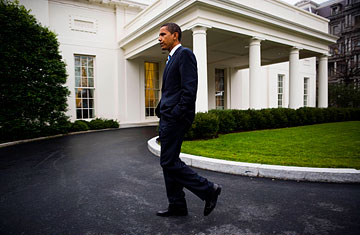
Barack Obama at the White House
President-elect Obama's Cabinet appointments are sending a powerful signal that change is on the way. His choice to run Veterans Affairs, retired general Eric Shinseki, was a brave critic of the Iraq war and is a staunch advocate for wounded vets. His pick for Housing and Urban Development Secretary, Shawn Donovan, has presided over a huge expansion of affordable housing in New York City. And his nominee for Energy Secretary, Stephen Chu (announced Monday), is a Nobel-winning physicist who preaches the gospel of efficiency. It's hard to imagine a starker contrast with their counterparts in the Bush Administration.
Um.
O.K., this is awkward.
Hold on.
Sorry, had to look them up. That would be VA Secretary James Peake, HUD Secretary Steve Preston and Energy Secretary Samuel Bodman. They're not exactly household names, which is why it's so weird that second-tier Cabinet appointees get so much attention initially; they rarely make much news once they're in office. That's why I've proposed shrinking the Cabinet, which has doubled in size yet probably halved in importance since the Kennedy Administration. But that's one thing Obama does not appear likely to change. Judging by his appointments thus far, the Cabinet will continue to be an irrelevant institution, while policy will still be made out of the White House. (See the top 10 Cabinet members.)
In fact, the most telling Obama appointments have been his economics pick, former Treasury Secretary Lawrence Summers; his environmental pick, former EPA head Carole Browner; and his new health-care czar, former Senate majority leader Tom Daschle — all of whom have lengthy Washington résumés and all of whom will be working out of the White House. Daschle's dual titles are the most telling; he was actually nominated to be Secretary of Health and Human Services, but Obama gave him a West Wing job as well to indicate that, unlike previous HHS Secretaries, Daschle is actually supposed to run the nation's health policy.
This is, in fact, a big change. In the Bush Administration, accomplished and independent-minded Cabinet Secretaries like former governors Christine Todd Whitman and Tommy Thompson bristled at marching orders from snot-nosed twentysomething White House apparatchiks. Obama's picks suggest that while his Cabinet Secretaries will take marching orders, the orders will at least come from seasoned heavyweights.
Of course, Hillary Clinton and Robert Gates are heavyweights too, and State, Defense, Justice and Treasury are all Cabinet jobs that have kept their clout. (Bush's latest Treasury Secretary, Henry Paulson, is apparently the new leader of the free world.) But the "team of rivals" analogies only go so far because Cabinets are no longer teams. And Cabinet Secretaries are increasingly chosen to send messages to interest groups and ethnic groups.
Obama's choices for departments like HUD and Energy telegraph his intent to change housing and energy policies, just as the creation of HUD and Energy were supposed to telegraph the importance of housing and energy problems. But it certainly hasn't solved those problems. Just once, it would be nice to see a Cabinet appointee — maybe a Commerce Secretary or an Agriculture Secretary or a drug czar — say that his or her department's mission was obsolete, or that it certainly didn't deserve Cabinet status.
That would send a powerful signal that change was on the way.
